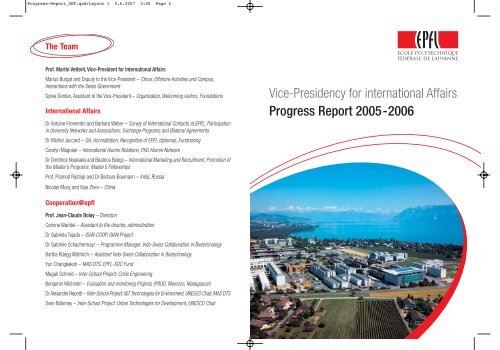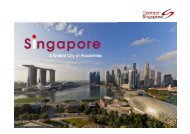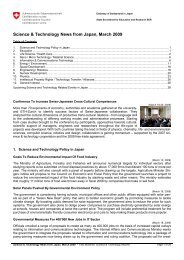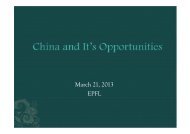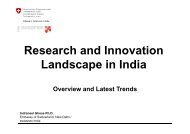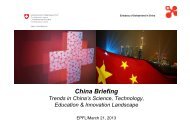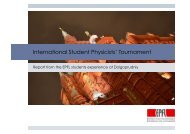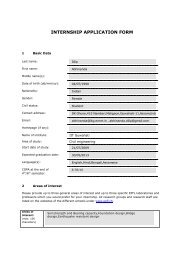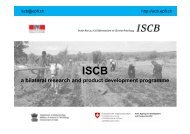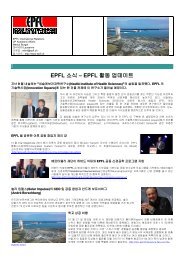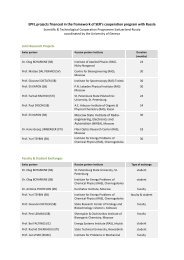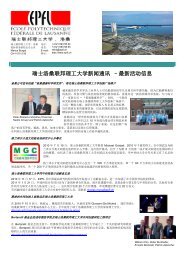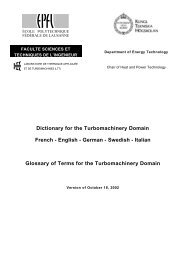International Affairs - Relations Internationales - EPFL
International Affairs - Relations Internationales - EPFL
International Affairs - Relations Internationales - EPFL
You also want an ePaper? Increase the reach of your titles
YUMPU automatically turns print PDFs into web optimized ePapers that Google loves.
Progress-Report_DEF.qxd:Layout 1 5.6.2007 3:00 Page 2<br />
The Team<br />
Prof. Martin Vetterli, Vice-President for <strong>International</strong> <strong>Affairs</strong><br />
Marius Burgat and Deputy to the Vice-President – China, Offshore Activities and Campus,<br />
Interactions with the Swiss Government<br />
Sylvie Dentan, Assistant to the Vice-President – Organization, Welcoming visitors, Foundations<br />
<strong>International</strong> <strong>Affairs</strong><br />
Dr Antoine Fromentin and Barbara Weber – Survey of <strong>International</strong> Contacts at <strong>EPFL</strong>, Participation<br />
in University Networks and Associations, Exchange Programs and Bilateral Agreements<br />
Dr Michel Jaccard – QA, Accreditation, Recognition of <strong>EPFL</strong> diplomas, Fundraising<br />
Carolyn Magnani – <strong>International</strong> Alumni <strong>Relations</strong>, PhD Alumni Network<br />
Dr Dimitrios Noukakis and Béatrice Belogi – <strong>International</strong> Marketing and Recruitment, Promotion of<br />
the Master’s Programs, Master’s Fellowships<br />
Prof. Pramod Rastogi and Dr Barbara Baumann – India, Russia<br />
Nicolas Musy and Xiao Zhen – China<br />
Cooperation@epfl<br />
Prof. Jean-Claude Bolay – Direction<br />
Corinne Waridel – Assistant to the director, administration<br />
Dr Gabriela Tejada – ISAB-COOP, GIAN Project<br />
Dr Gabriele Schachermayr – Programme Manager, Indo-Swiss Collaboration in Biotechnology<br />
Barbla Rüegg Wüthrich – Assistant Indo-Swiss Collaboration in Biotechnology<br />
Yuri Changkakoti – MAS DTS, <strong>EPFL</strong>-SDC Fund<br />
Magali Schmid – Inter-School Project: Crisis Engineering<br />
Benjamin Michelon – Evaluation and monitoring Projects (PRUD, Morocco, Madagascar)<br />
Dr Alexandre Repetti – Inter-School Project: I&T Technologies for Environment, UNESCO Chair, MAS DTS<br />
Sven Bolomey – Inter-School Project: Urban Technologies for Development, UNESCO Chair<br />
Vice-Presidency for international <strong>Affairs</strong><br />
Progress Report 2005-2006
Progress-Report_DEF.qxd:Layout 1 5.6.2007 3:00 Page 2<br />
Foreword<br />
The Vice-Presidency for <strong>International</strong> <strong>Affairs</strong> (VPRI), established<br />
two years ago, is a pioneering initiative by <strong>EPFL</strong> in its<br />
organization. Building on the groundwork carried out by<br />
Prof. Dominique de Werra’s previous <strong>International</strong> <strong>Relations</strong><br />
Unit, VPRI has now expanded its strategic role.<br />
VPRI activities now extend to the enlarged EU (European<br />
Union), to North America and to Asia (especially China and<br />
India). As in the past, part of <strong>EPFL</strong>’s work in international<br />
relations aims at organizing student exchange opportunities<br />
through MoUs 1 and ensuring the <strong>EPFL</strong>’s presence at student recruiting events. In<br />
2004, the State Secretariat for Education & Research (SER) mandated <strong>EPFL</strong> with<br />
the coordination and implementation of the Indo Swiss Joint Research Programme<br />
(ISJRP). This program was jointly initiated by the Swiss and Indian Governments and<br />
aims at increasing the number and scope of collaborations between Swiss and<br />
Indian scientists through the promotion of joint research projects.<br />
VPRI pursues a policy of active promotion of the <strong>EPFL</strong>’s master’s programs, focusing<br />
on the dynamic campus environment of students, PhD candidates, young<br />
researchers and professors. This activity is coupled with fundraising to generate<br />
more scholarship and fellowship awards. All these projects are making steady<br />
progress.<br />
The multiplicity of global actors in higher education, the uneven quality of their<br />
services, and occasionally occurrences of fraud in certain countries, are strengthening<br />
the need for Quality Assurance for the sake of transparency at the bachelor<br />
and master levels. The basic framework conditions are laid out in the Bologna<br />
process. In 2006, <strong>EPFL</strong> once again took the lead by requesting an accreditation of<br />
its master’s programs and recognition of its Quality System by two European<br />
agencies (CTI and OAQ 2 ), based on the ENQA 3 quality standard.<br />
1 MoU: Memorandum of Understanding.<br />
2 Commission des Titres d’Ingénieur (F: Academic and Professional recognition)<br />
et Organe d´Accréditation et d´assurance Qualité des hautes écoles suisses (OAQ).<br />
3 European Network for Quality Assurance (ENQA).<br />
Because EU information does not freely flow to Swiss universities, <strong>EPFL</strong> often finds<br />
itself in a position in which it needs to make assessments of EU initiatives in the<br />
EHEA 4 . In a fast-changing world, gathering information are core missions for the<br />
VPRI team, for instance through addressing targeted invitations to top universities<br />
or participation in reputed academic networks.<br />
<strong>EPFL</strong> has a long tradition of North-South commitments in close association with<br />
the Swiss government’s cooperation activities, as attested to by the success of the<br />
Cooperation@epfl group led by Professor Jean-Claude Bolay. The Cooperation<br />
Group has been awarded a UNESCO Chair in Technologies for Development. The<br />
group focuses in four priority areas: sustainable development for cities; disaster<br />
management; renewable energy; environmental information and communications.<br />
The Chair will bring better visibility to these activities and facilitate partnerships with<br />
institutions in emerging and developing countries.<br />
Finally, the VPRI’s leadership also relies on the quality of contacts established<br />
with <strong>EPFL</strong> programs, Schools and particularly with the Vice-Presidency for<br />
Academic <strong>Affairs</strong>. I wish to thank our partners for these fruitful collaborations<br />
and, last but not least, all VPRI collaborators for their commitment.<br />
Prof. Martin Vetterli<br />
<strong>EPFL</strong> Vice-President for <strong>International</strong> <strong>Affairs</strong><br />
4 European High Education Area (EHEA).
Progress-Report_DEF.qxd:Layout 1 5.6.2007 3:00 Page 4<br />
Content<br />
Impressum.................................................................................................6<br />
A: <strong>International</strong> <strong>Affairs</strong>....................................................................7<br />
1. Mission and Vision ..............................................................................8<br />
2. Driving Forces...................................................................................10<br />
3. Goals, Achievements and Prospects .................................................12<br />
3.1 Priority countries: India, China, Russia..........................................12<br />
3.2 Welcoming Visitors .....................................................................16<br />
3.3 Interactions with the Swiss Government .......................................18<br />
3.4 Survey of <strong>International</strong> Contacts at <strong>EPFL</strong> ......................................19<br />
3.5 Participation in University Networks and Associations....................20<br />
3.6 Exchange Programs and Bilateral Agreements..............................22<br />
3.7 <strong>International</strong> Marketing and Recruitment,.....................................24<br />
Promotion of the Master’s Programs<br />
3.8 Master’s Fellowships, Foundations and Fundraising ......................29<br />
3.9 Recognition of <strong>EPFL</strong> Diplomas .....................................................30<br />
3.10 Quality Assurance and Accreditation ............................................32<br />
3.11 <strong>International</strong> Alumni <strong>Relations</strong>: PhD Alumni Network .....................33<br />
3.12 Offshore Activities and Campus ...................................................34<br />
B: Cooperation@epfl .....................................................................35<br />
1. Introduction.......................................................................................36<br />
2. Scientific Cooperation for Development at <strong>EPFL</strong> ..............................36<br />
3. The Creation of Cooperation@epfl....................................................37<br />
4. ISAB-COOP Team of Experts .............................................................38<br />
5. Enabling Technologies for Development and Beyond .......................40<br />
5.1 UNESCO Chair in Technologies for Development ...........................41<br />
5.2 Indo-Swiss Collaboration in Biotechnology (ISCB)..........................41<br />
5.3 Interschool Projects ....................................................................43<br />
5.4 <strong>EPFL</strong>-SDC Fund..........................................................................45<br />
5.5 Seed Money Funding Program ....................................................46<br />
5.6 MAS in Development, Technologies and Society (MAS DTS)...........46<br />
5.7 Cooperation and Development Conference 2006..........................47<br />
6. Strategic Axes and Guidelines for the Future ......................................48<br />
7. Cooperation@epfl’s Budget and Future Objectives ............................ 49
Progress-Report_DEF.qxd:Layout 1 5.6.2007 3:00 Page 6<br />
6<br />
VPRI<br />
Impressum<br />
Editor-in-chief, design: Michel Jaccard<br />
Proofreading, control: Mary Parlange, Anne Viscolo<br />
Published: June 2007, 1100 copies<br />
Address<br />
Dr Michel Jaccard (michel.jaccard@epfl.ch)<br />
Senior Scientific Advisor, Vice-Presidency for <strong>International</strong> <strong>Affairs</strong><br />
<strong>EPFL</strong> VPRI, CM 2 204, Station 10<br />
CH-1015 Lausanne<br />
<strong>International</strong> <strong>Affairs</strong><br />
VPRI<br />
7
Progress-Report_DEF.qxd:Layout 1 5.6.2007 3:00 Page 8<br />
A<br />
8<br />
VPRI<br />
<strong>International</strong> <strong>Affairs</strong><br />
1. Mission and Vision<br />
Mission statement<br />
Vision<br />
The Vice-Presidency for <strong>International</strong> <strong>Affairs</strong> (VPRI) facilitates and develops the<br />
international mission of <strong>EPFL</strong> (and of the ETH Domain). It provides support to the<br />
<strong>EPFL</strong> members.<br />
The Vice-Presidency is the promoter of the international educational experience<br />
and of international academic “intelligence” for the <strong>EPFL</strong> community. This unit is a<br />
key contributor to the globalization process of the <strong>EPFL</strong> and its growing reputation<br />
as a major international educational and research institution.<br />
The Vice-Presidency’s core missions are:<br />
to identify international centers of academic excellence (crucial academic<br />
information gathering, identification of best practices, early detection) and<br />
develop appropriate partnerships;<br />
to offer <strong>EPFL</strong> students opportunities to study abroad in leading universities;<br />
to attract the best students worldwide;<br />
to design and promote selected global/offshore activities.<br />
The Office for <strong>International</strong> <strong>Affairs</strong> enhances <strong>EPFL</strong>’s visibility as an institution of<br />
international renown by developing activities such as:<br />
active networking with key universities;<br />
efficient positioning of <strong>EPFL</strong> in first-rate international university associations;<br />
reaching out to the alumni, EU and EHEA 5 communities to promote international<br />
themes and to strengthen the international components of the curricula,<br />
research and student/faculty activities (doctoral programs included).<br />
5 European Union and European High Education Area (EHEA).<br />
Role<br />
The Vice-Presidency is the organizational link between all <strong>EPFL</strong> Programs that<br />
have international components. The whole team regards itself as:<br />
a promoting, coordinating and moderating actor in international relations,<br />
responsible for assuring the continuity of the policies and activities of <strong>EPFL</strong>’s<br />
international affairs;<br />
a service provider for scholars and academics, for local and international students<br />
and for <strong>EPFL</strong> staff.<br />
The Vice-President for <strong>International</strong> <strong>Affairs</strong>, a member of the <strong>EPFL</strong> Senior<br />
Management Team, is responsible for handling and implementing policy issues<br />
and for the further development of the university’s internationalization strategy.<br />
VPRI<br />
9
Progress-Report_DEF.qxd:Layout 1 5.6.2007 3:00 Page 10<br />
A<br />
10<br />
VPRI<br />
<strong>International</strong> <strong>Affairs</strong><br />
2. Driving Forces<br />
<strong>International</strong>ization of Higher Education<br />
The internationalization of higher education is a great opportunity for <strong>EPFL</strong>: it gives<br />
<strong>EPFL</strong> students a chance to gain international experience and attracts a larger<br />
number of gifted international students to the campus (especially in master’s and<br />
doctoral programs). To remain a world-class university, <strong>EPFL</strong> must also enhance<br />
its international image and be competitive in global higher education, especially<br />
in the aforementioned programs. An <strong>EPFL</strong> education must match or better the<br />
quality standards of the US’s best technological universities. The <strong>EPFL</strong> campus<br />
has the advantage of a long tradition of internationality.<br />
An important objective for <strong>EPFL</strong> is to educate top international scientists and<br />
engineers. Switzerland needs young and qualified entrepreneurs to ensure its<br />
economic growth in the future.<br />
<strong>International</strong>ization of higher education at <strong>EPFL</strong> also includes providing aid to universities<br />
in the developing world, a role for which there is a long tradition at <strong>EPFL</strong>.<br />
Impact of the EU and EHEA 6<br />
European policy in research and higher education has a strong impact on Swiss<br />
academic policy. <strong>EPFL</strong> is currently gathering information on three main projects.<br />
The Bologna Process: the Bologna Declaration of 1999 laid the basis of a process<br />
for establishing a European Higher Education Area. Apart from the new guidelines<br />
for the doctorate and postdoc – to be set by the forthcoming Communiqué of the<br />
Conference of the European Ministers of Higher Education (London, 2007) – <strong>EPFL</strong><br />
has implemented all recommendations of the Bologna process.<br />
EU enlargement to the East is guiding <strong>EPFL</strong>’s promotional activities in the new<br />
member states.<br />
6 European Union (EU) and European High Education Area (EHEA).<br />
European Institute of Technology (EIT): the concept of an EIT was first introduced<br />
by the Commission in 2005. On 18 October 2006 the Commission put forward a<br />
proposal for a Regulation of the European Parliament and of the Council establishing<br />
the EIT. The Commission is proposing an integrated, two-level structure of the<br />
EIT that combines both a bottom-up and a top-down approach: a governance<br />
structure based on a Governing Board (GB). The GB will set the strategic priorities<br />
of the EIT and take charge of Knowledge and Innovation Communities (KICs). KICs<br />
are joint-ventures of partner organizations representing universities, research<br />
organizations and businesses. The participation of <strong>EPFL</strong> institutes in KICs (climate<br />
change, bioinformatics and life sciences, nanotechnology) represents a challenge,<br />
but is also a unique opportunity to enhance <strong>EPFL</strong>’s reputation and visibility. The VPRI<br />
is making use of its existing networks (CLUSTER, CESAER, etc.) to position <strong>EPFL</strong> at<br />
the top level in the EIT project.<br />
European Research Council (ERC): the European Union is taking a major step<br />
towards the realization of a European Research Area by financially supporting<br />
scientific research. The ERC will be the first pan-European funding agency for<br />
cutting edge research. Early stage as well as fully established investigators will<br />
be able to compete for ERC grants with scientific excellence as the sole criterion<br />
for funding. The acceptance of <strong>EPFL</strong> projects will increase the institution’s prestige,<br />
its presence on the European stage as well as increase <strong>EPFL</strong>’s third-party funding.<br />
In close cooperation with VPAA, VPRI aims to provide researchers with adequate<br />
and relevant information on ERC governance and programs.<br />
The promotion of PhD programs and the development of “offshore” research<br />
centers and institutions mobilize the <strong>EPFL</strong> Office for <strong>International</strong> <strong>Affairs</strong>.<br />
Janez Potocnik, European Commissioner<br />
for Sciences and Research, discusses Physics<br />
of High Energy with Prof. G. Margaritondo,<br />
Vice-president for Academic <strong>Affairs</strong>, and<br />
Prof. Tran Minh Quang, Director of CRPP<br />
(November 2005).<br />
VPRI<br />
11
Progress-Report_DEF.qxd:Layout 1 5.6.2007 3:00 Page 12<br />
A<br />
12<br />
VPRI<br />
<strong>International</strong> <strong>Affairs</strong><br />
3. Goals, Achievements and Prospects<br />
3.1 Priority countries: India, China, Russia<br />
India 7<br />
Particular emphasis is currently being put on India, China and Russia.<br />
India is on the brink of a major transformation. Reforms initiated in 1991 have<br />
paved the way for a rapid development and repositioning of the Indian economy.<br />
Today, India has one of the fastest growing economies in the world. India has<br />
been continuously increasing its investment in science and technology, and this<br />
seems to be garnering handsome dividends. The last decade has witnessed India<br />
becoming a global R&D center; companies from around the world are increasingly<br />
on the look-out for new business opportunities in India.<br />
<strong>EPFL</strong> has taken several initiatives to forge collaborative ties between the Indian<br />
Institutes of Technology (IIT) and the Indian Institute of Science (IISc). A major<br />
achievement in this respect was the initiation of an “<strong>EPFL</strong>-IIT/IISc Exchange<br />
Program” in which <strong>EPFL</strong> students enroll for one or two semesters at one of the<br />
renowned IITs or at the IISc and vice versa. Since its inception in the year 2000,<br />
around 80 <strong>EPFL</strong> students and 250 Indian students have been involved.<br />
Though the primary goal of this initiative was to benefit students by providing<br />
them with new learning experiences and networking opportunities in another<br />
country, the Schools hosting and supervising these young and motivated people<br />
often equally gained from this exchange. As a consequence, the number of Indian<br />
students enrolled in a doctoral program at <strong>EPFL</strong> has increased from one student<br />
in 2000 to 51 in 2006.<br />
7 Dr B. Baumann and Prof. P. K. Rastogi.<br />
The two postgraduate courses on “Technology and Sustainable Development”<br />
jointly organized by <strong>EPFL</strong> and IIT Madras in 2002 and 2005 were similarly successful<br />
in establishing contacts between Swiss and Indian scientists. 20 participants<br />
from different countries attended these 16-week courses held in Chennai.<br />
Lectures were given by faculty members from Swiss and Indian universities and<br />
by representatives of international organizations, NGOs and private companies.<br />
A third course is planned for 2008.<br />
Indian PhD student and Swiss researcher, both<br />
involved in the project ’Isolation, characterization<br />
and mutagenesis of long-range acting bacterial<br />
transcription regulators with receptor domains for<br />
aromatic compounds’ supported by the ISJRP.<br />
In 2004, the State Secretariat for Education & Research (SER) mandated <strong>EPFL</strong> with<br />
the coordination and implementation of the Indo Swiss Joint Research Programme<br />
(ISJRP). This program was jointly initiated by the Swiss and Indian Governments<br />
and aims at increasing the number and scope of collaborations between Swiss<br />
and Indian scientists through the promotion of joint research projects. Currently,<br />
ISJRP is supporting nine joint projects in Information Technology and three in the<br />
Life Sciences.<br />
In summer 2006, short-term financial backing from SER enabled <strong>EPFL</strong> to start<br />
the Indo Swiss Bilateral Research Initiative (ISBRI). ISBRI’s goal is to initiate new<br />
contacts between Swiss and Indian scientists by providing travel and research<br />
fellowship grants to young faculty members and Ph.D. students who wish to visit<br />
a prospective partner institute in the counterpart country. So far, more than forty<br />
scientists from various Swiss and Indian Universities have already benefited from<br />
these grants.<br />
VPRI<br />
13
Progress-Report_DEF.qxd:Layout 1 5.6.2007 3:00 Page 14<br />
A<br />
14<br />
China<br />
VPRI<br />
<strong>International</strong> <strong>Affairs</strong><br />
In November 2006, <strong>EPFL</strong> was officially designated as the Swiss Leading House<br />
for India. In this important national capacity, the institution will be responsible for<br />
the implementation of SER’s Bilateral Scientific and Technology Cooperation<br />
Program with India for the period 2008 to 2011. <strong>EPFL</strong> will play a key role in<br />
strengthening academic relationships between Switzerland and India in all areas<br />
of science, technology, engineering and the humanities.<br />
China’s science and technology are developing quickly; its economy is also taking<br />
on a world-leading role. China is about to invest more money into R&D than the<br />
European Community. Economic relations between China and Switzerland are<br />
steadily developing. Many multinational firms, among them a number of Swiss<br />
companies, are established in China, making this country an important location for<br />
our graduates. Asia is swiftly becoming a major academic pole; many scientists<br />
and faculty members at <strong>EPFL</strong> have developed academic relationships with<br />
Chinese researchers and institutes.<br />
The VPRI set up a team 8 to develop initiatives with renowned universities in China,<br />
to support collaboration and exchange between <strong>EPFL</strong> professors and Chinese<br />
The visit by The Tsinghua Senior<br />
Management Team (here Gu<br />
Binglin, President of Tsinghua<br />
with <strong>EPFL</strong> President Patrick<br />
Aebischer) in the beginning<br />
of 2007 was carefully prepared<br />
by VPRI in 2005 and 2006.<br />
8 Zhen Xiao, BS Eng, currently Research Assistant at <strong>EPFL</strong>, Nicolas Musy,<br />
Dipl. Physics Engineer <strong>EPFL</strong>, based in China since 1988, Marius Burgat.<br />
scientists and to enhance exchange opportunities for <strong>EPFL</strong> Master’s students<br />
(<strong>EPFL</strong> regularly welcomes 70 to 100 Chinese students):<br />
Chinese academic delegations visiting <strong>EPFL</strong>: 20 Chinese delegations visited<br />
<strong>EPFL</strong> – this gave us an opportunity to get in touch with the Chinese academic<br />
world. <strong>EPFL</strong> was not well known in China, and visitors were very interested by<br />
<strong>EPFL</strong>’s performance and achievements, organization, processes and management<br />
structure.<br />
Targeted on-campus visit in China: To get in touch with a few key universities,<br />
a visit was made by the VPRI’s Chinese team in July ’06 to ascertain <strong>EPFL</strong>’s<br />
status and image in China and to prepare for the visit by the Senior<br />
Management Team in the Fall. Universities that were visited included Beijing<br />
(PKU), Tsinghua, Tianjing Univ., Nankai Univ., Fudan, Shanghai Jiaotong,<br />
Zehjiang Univ.<br />
Follow this, the Vice-President for <strong>International</strong> <strong>Affairs</strong>, Prof. Martin Vetterli,<br />
visited China in December 2006 with an <strong>EPFL</strong> delegation and signed cooperation<br />
agreements (MoUs 9 ) with three prestigious Universities:<br />
Beijing University (PKU);<br />
Tsinghua University;<br />
Shanghai Jiaotong University.<br />
These new collaborations are in addition to the student exchange agreements<br />
signed with the Hong Kong University of Science and Technology (HKUST),<br />
Chinese University of Hong Kong and also with Singapore (NUS – National<br />
University of Singapore and NTU – Nanyang Technological University), where the<br />
Chinese community is particularly active.<br />
For many years now, Chinese scientists – up to 100 at a time – have been on<br />
the <strong>EPFL</strong> campus. The team intends to keep in touch with these <strong>EPFL</strong> Chinese<br />
alumni. <strong>EPFL</strong> will consolidate relations with partners established in 2006 and<br />
explore possibilities with newly selected universities.<br />
9 Memorandum of Understanding.<br />
VPRI<br />
15
Progress-Report_DEF.qxd:Layout 1 5.6.2007 3:00 Page 16<br />
A<br />
16<br />
Russia<br />
VPRI<br />
<strong>International</strong> <strong>Affairs</strong><br />
Over the past few years <strong>EPFL</strong> has worked successfully to expand S&T relationships<br />
with leading universities in Russia, such as the Tomsk Polytechnic University, the<br />
Bauman Moscow State Technical University and the M.V. Lomnosov Moscow<br />
State University. Specific exchange agreements promoting academic mobility<br />
between <strong>EPFL</strong> and these universities contributed considerably to this development.<br />
Today, about thirty scientists at <strong>EPFL</strong> are involved or have recently been<br />
involved in collaborative projects with Russian researchers, mostly in the field of<br />
technology, physics and mathematical sciences. In many cases strong lab-to-lab<br />
relationships, from which both parties are gaining equal, significant scientific<br />
benefit, have been developed.<br />
Recently, <strong>EPFL</strong> has been appointed as the «Associated Leading House for Russia»<br />
by the State Secretariat for Research and Education (SER). In this capacity it will<br />
assist the University of Geneva, the «Leading House for Russia» in the implementation<br />
of SER’s bilateral S&T cooperation strategy with Russia (2008-2011).<br />
3.2 Welcoming Visitors 10<br />
Welcoming foreign academic, political or economic delegations enhances <strong>EPFL</strong>’s<br />
international image abroad, in the media and with the Swiss Government. Many<br />
of these delegations are directed or referred to <strong>EPFL</strong> by the Cantonal or Federal<br />
authorities or by international organizations. The program of visits is coordinated<br />
with the President’s public relations group, comprising members of the VPRI<br />
team. In 2007, <strong>EPFL</strong> will further develop strategic contacts.<br />
Outstanding guests 2005-2006: <strong>EPFL</strong> was honored to welcome visits and official<br />
delegations from key countries and institutions:<br />
Abdul Kalam, President of India; Kapil Sibal, Minister for Science and Technology<br />
(India);<br />
10 M. Burgat, Dr A. Fromentin, S. Dentan, B. Weber.<br />
M. Han Qide, Vice-president of the Chinese National Assembly and Vice-President<br />
of Beijing University; Professor Jiang Shusheng, President of Nanjing University<br />
of Information Sciences and Technology, China;<br />
Prof. Shih Choon Fong, President of the the National University of Singapore;<br />
Dr Su Guaning, President of Nanyang Technological University (Singapore;<br />
NTUS); Dr Toni Tan, President of National Research Foundation, Singapore;<br />
Prof. Dr. J. Potocnik, ˘ European Commissioner for Science and Research; Mr. Jan<br />
Figuel, European Commissioner for education; José Mariano Gago, Portuguese<br />
Minister of Science, Technology and Higher Education;<br />
Mr. Rachid Haraoubia, Algerian Minister of Higher Education and Research;<br />
Mr. Mosibudi Mangena, Minister of Science and Technology in South Africa;<br />
H.E. Dr Konji Sebati, Ambassador of South Africa in Switzerland.<br />
Database: A database regrouping all the visits organized at <strong>EPFL</strong> since 2001 is in<br />
place; the record of all visitors can be consulted (contact: barbara.weber@epfl.ch).<br />
Mr. Mosibudi Mangena, Minister of Science and<br />
Technology in South Africa, watching High Tech<br />
equipments of <strong>EPFL</strong> (June 2005).<br />
VPRI<br />
17
Progress-Report_DEF.qxd:Layout 1 5.6.2007 3:00 Page 18<br />
A<br />
18<br />
VPRI<br />
<strong>International</strong> <strong>Affairs</strong><br />
3.3 Interaction with the Swiss Government 11<br />
SER<br />
CRUS<br />
IRUS<br />
VPRI has excellent relations with SER (State Secretariat for Education and<br />
Research) through an active participation in defining an integrated international<br />
relations strategy for Switzerland and by jointly organizing the welcoming of foreign<br />
delegations. There are also numerous and fruitful contacts with the scientific<br />
attachés and Swiss Houses reporting to SER. Indeed, these ambassadors help<br />
<strong>EPFL</strong> in gathering crucial academic information and organizing visits or events<br />
abroad (e.g. by representing our institution at recruitment fairs abroad).<br />
VPRI represents <strong>EPFL</strong> within the DIZ (Delegation <strong>International</strong>e Zusammenarbeit)<br />
of the CRUS (Rectors’ Conference of the Swiss Universities). VPRI’s main role<br />
within this group is to coordinate international relations between CRUS and <strong>EPFL</strong>.<br />
VPRI also participates to NAFSA 12 annual conference in the U.S. and EAIE 13 national<br />
conference in Europe. VPRI also acts as the <strong>EPFL</strong> contact with the Swiss office<br />
in charge of the ERASMUS program (ICES 14 ), reporting to CRUS, for all matters<br />
relating to student mobility.<br />
IRUS (<strong>International</strong> <strong>Relations</strong> Universities of Switzerland) is an informal network<br />
bringing together representatives of international relations departments of all<br />
Swiss universities and federal institutes of technology. The network is very active<br />
in the fields of lobbying, information exchange and the joint organization of events<br />
abroad (e.g., visit to China by an IRUS delegation at the Chinese government’s<br />
invitation).<br />
11 Dr A. Fromentin and M. Burgat.<br />
12 NAFSA; Association of <strong>International</strong> Educators.<br />
13 EAIE; European Association of <strong>International</strong> Educators.<br />
14 ICES; Information et Coordination ERASMUS Suisse.<br />
3.4 Survey of <strong>International</strong> Contacts at <strong>EPFL</strong> 15<br />
Jan Figuel, European<br />
Commissioner for education,<br />
training and culture, discovers<br />
<strong>EPFL</strong> in presence of Ch. Kleiber,<br />
State Secretary for education<br />
and research (September 2006).<br />
As <strong>EPFL</strong> increases its international efforts and impact, it is essential to be aware of<br />
the individual activities and projects of <strong>EPFL</strong> professors. In setting priorities at the<br />
national level (SER, ETH-Board) it has also become crucial to assess the initiatives<br />
of the <strong>EPFL</strong> labs so as to position <strong>EPFL</strong> accordingly. A survey (”<strong>International</strong><br />
Contacts at <strong>EPFL</strong>”, Fromentin 2006) was conducted among faculty members at<br />
<strong>EPFL</strong> in order to evaluate their international relationships. Three main questions<br />
were asked:<br />
With which institutions or universities has your laboratory been working for the<br />
last five years (current contacts)?<br />
What are your priorities for future research collaboration and student recruitment?<br />
In which countries do you have a good understanding of the academic or<br />
research system?<br />
15 Dr A. Fromentin et B. Weber.<br />
VPRI<br />
19
Progress-Report_DEF.qxd:Layout 1 5.6.2007 3:00 Page 20<br />
A<br />
20<br />
VPRI<br />
70%<br />
60%<br />
50%<br />
40%<br />
30%<br />
20%<br />
10%<br />
0%<br />
<strong>International</strong> <strong>Affairs</strong><br />
With close to 90 % response rate, the survey was representative.<br />
Current Contacts and Priorities for Research and Recruitment<br />
Western<br />
Europe<br />
Eastern<br />
Europe and<br />
Russia<br />
North<br />
America<br />
Latin<br />
America<br />
Australia Middle<br />
East<br />
Contact<br />
Research<br />
Recruitment<br />
India China Other<br />
countries of<br />
Southeast Asia<br />
Africa<br />
Current contacts by region, in % of the total number of contacts, as well as priorities for future<br />
research collaboration and for MS/PhD student recruitment.<br />
The results show a preponderance of contacts with Europe and then with North<br />
America, but also a strong emergence of Asia for recruitment interests. Our most<br />
important research partner remains the USA. The results are in agreement with<br />
the VPRI strategy.<br />
3.5 Participation in University Networks and Associations 16<br />
University associations are a valuable source of academic information and long<br />
term partnerships. <strong>EPFL</strong> is part of 10 different academic networks. VPRI was particularly<br />
active in:<br />
16 Dr A. Fromentin et Dr M. Jaccard.<br />
1) CLUSTER (Consortium Linking Universities of Science and Technology for<br />
Education and Research). <strong>EPFL</strong> participates in working groups reviewing the<br />
European dimension in science education, university management (benchmarking),<br />
joint master’s, Quality Assurance, marketing, contacts with Latin<br />
American institutions and Australian networks (Go8 17 , ATN 18 ).<br />
2) CESAER (Conference of European Schools for Advanced Engineering<br />
Education and Research) is an association of nearly 60 leading European<br />
Engineering Universities, Colleges and Schools. In 2006, the main concerns<br />
were Quality Assurance, outcomes of PhD programs, the European Institute of<br />
Technology and the mutual recognition of BS diplomas.<br />
3) TIME (Top Industrial Managers for Europe) is the leading network for the training<br />
of bi-cultural, bilingual engineers and includes leading Technical<br />
Universities and Engineering High Schools. To improve MS student recruitment,<br />
<strong>EPFL</strong> will foster vertical mobility with TIME members.<br />
4) EUA (European University Association) represents higher education institutions,<br />
providing them with a unique forum to keep abreast of the latest trends<br />
in higher education and research policies. The Association’s mandate in the<br />
Bologna process, contribution to EU research policy-making and relations with<br />
intergovernmental organizations ensure its capacity to debate crucial issues.<br />
Fundraising, master’s and doctoral programs were key points in 2006.<br />
5) The Magna Charta Observatory aims to protect university values and rights in<br />
the EHEA. Serious concerns are expressed about the rising threats of academic<br />
fraud/corruption and the lack of autonomy in Eastern European universities.<br />
<strong>EPFL</strong> is also a member of GUNI (Global University Network for Innovation, a partner<br />
of UNESCO). The conference “Higher Education in the World 2007” featured major<br />
trends: accreditation, Quality Assurance and educational outreach. The activities<br />
of other global associations, for instance, ASEAN University Network (AUN), are<br />
monitored with the help of CESAER and TIME.<br />
17 Go8 = Group of 8, network of the 10 best engineering universities in Australia.<br />
18 ATN = Australian Technology Network.<br />
VPRI<br />
21
Progress-Report_DEF.qxd:Layout 1 5.6.2007 3:00 Page 22<br />
A<br />
22<br />
VPRI<br />
<strong>International</strong> <strong>Affairs</strong><br />
3.6 Exchange Programs and Bilateral Agreements 19<br />
VPRI manages more than 150 active agreements, mainly concerning student<br />
exchange programs 20 . These agreements comply with <strong>EPFL</strong>’s international relations<br />
policy, namely to recruit top students and researchers, to allow our students<br />
to be exposed to the “globalized” world in the best institutions, and to increase<br />
<strong>EPFL</strong>’s visibility. The main criterion is the excellence of the partner institution,<br />
without any geographical restriction.<br />
Two types of MoU (Memorandum of Understanding) are widely used:<br />
bilateral agreements under the SOCRATES-ERASMUS program umbrella;<br />
general agreements, mainly with partners outside Europe.<br />
During the academic year 2005-2006, <strong>EPFL</strong> signed new bilateral agreements with:<br />
Prague Czech Technical University (E 21 );<br />
Universitat Autonoma de Barcelona (E);<br />
Universitat de Girona (E);<br />
Mondragon Unibertsitatea (E);<br />
Università degli studi di Brescia (E);<br />
Université de Paris 13 (Paris-Nord) (E);<br />
Ecole Normale Supérieure Paris (E);<br />
Istanbul Technical University (E);<br />
and general agreements with:<br />
University of California at Berkeley;<br />
Nanyang Technological University Singapore;<br />
Chinese University of Hong Kong;<br />
19 Dr A. Fromentin.<br />
20 Research agreements are usually administered at laboratory or institute levels.<br />
21 E = SOCRATES-ERASMUS bilateral agreement.<br />
No. of Students<br />
70<br />
60<br />
50<br />
40<br />
30<br />
20<br />
10<br />
0<br />
Tomsk Polytechnic University;<br />
Peking University (PKU);<br />
Tsinghua University, Beijing;<br />
Shanghai Jiaotong University;<br />
In order to support the SOCRATES-ERASMUS student exchange program, an<br />
agreement was signed with the Swiss State Secretariat for Education and<br />
Research (SER); for the academic year 2006-2007, an amount of 125 kCHF<br />
(without the ERASMUS scholarships) has been transferred to VPRI.<br />
Student Exchanges 2005-2006<br />
21<br />
62<br />
56<br />
16 17 17<br />
69<br />
14<br />
9<br />
3<br />
18<br />
1<br />
13<br />
Germany<br />
Spain<br />
France<br />
UK<br />
Italy<br />
Belgium<br />
Ireland<br />
8<br />
3 3 2 5<br />
1<br />
Netherlands<br />
6 7 6<br />
Denmark<br />
Portugal<br />
USA<br />
15<br />
27<br />
24<br />
Country<br />
39<br />
Canada<br />
Sweden<br />
Austria<br />
4 6<br />
1 4<br />
<strong>EPFL</strong> Students OUT (tot 190)<br />
Guest Students IN (tot 344)<br />
5<br />
1 2<br />
Finland<br />
Norway<br />
Romania<br />
Poland<br />
Czech. Rep.<br />
Hungary<br />
Mexico<br />
Russia<br />
Japan<br />
Hong Kong<br />
India<br />
Tailored curricula<br />
<strong>International</strong> students come mainly from France, Germany, Spain, Sweden and Canada. <strong>EPFL</strong> students<br />
tend to select these countries.<br />
4<br />
2 2 5<br />
1 1 1 1<br />
11<br />
38<br />
VPRI<br />
23
Progress-Report_DEF.qxd:Layout 1 5.6.2007 3:00 Page 24<br />
A<br />
24<br />
VPRI<br />
<strong>International</strong> <strong>Affairs</strong><br />
Operational activities for incoming and outgoing exchange students are under the<br />
responsibility of the DAF 22 (Eliane Reuille) and of the Schools. However, VPRI provides<br />
additional support – for example, organization of welcome and farewell information<br />
meetings for incoming exchange students (between 150-180 participants).<br />
September 2005: Pause before<br />
the signature of a MoU with the<br />
Nanyang Technology University<br />
of Singapore (President of NTU,<br />
Dr. Su Guaning; extreme right).<br />
3.7 <strong>International</strong> Marketing and Recruitment – Promotion of<br />
the Master’s Programs 23<br />
The <strong>EPFL</strong> Master’s Promotion Team (MPT) was formed in November 2005.<br />
During this first year, MPT structured efforts around three activities:<br />
Establishment of a marketing strategy that is accepted by all stakeholders;<br />
Review of internal processes to align them with the marketing plan;<br />
Development of promotional tools and initiation of promotional activities.<br />
22 Direction de la formation – Direction of Education.<br />
23 Dr D. Noukakis and B. Belogi.<br />
SAC<br />
Dean<br />
BS/MS<br />
Intern'l<br />
Students<br />
Services<br />
(SOC)<br />
Masters<br />
Promotion<br />
Team<br />
Intern'l<br />
<strong>Relations</strong><br />
(MPT)<br />
The activities of the MPT (Master Promotion Team) involve many key players at <strong>EPFL</strong>.<br />
Since these activities often take place at the interface between VPRI and VP-AA,<br />
MPT works closely with the Dean of Bachelor’s/Master’s programs, the DAF 24 ,<br />
the SAC 25 , and the SOC 26 , as well as with the Media and Communications Office.<br />
In addition, a great deal of time is spent working together with the Program<br />
Directors and Deputy Directors, as well as with students and representatives of<br />
student associations.<br />
Development of a Marketing Strategy<br />
Corporate<br />
Comm.<br />
BS/MS<br />
Directors<br />
<strong>EPFL</strong> is seeking to recruit outstanding students for its master’s programs.<br />
Therefore, the “target student” is an excellent student from a top institution.<br />
24 Direction des Affaires Académiques <strong>EPFL</strong>.<br />
25 Service académique <strong>EPFL</strong>.<br />
26 Service d’Orientation et de Conseil <strong>EPFL</strong>.<br />
VPRI<br />
25
Progress-Report_DEF.qxd:Layout 1 5.6.2007 3:00 Page 26<br />
A<br />
26<br />
Total Number of Applicants<br />
VPRI<br />
120<br />
100<br />
80<br />
60<br />
40<br />
20<br />
0<br />
<strong>International</strong> <strong>Affairs</strong><br />
<strong>International</strong> students 2005/6<br />
Applications / Admissions / Enrolment breakdown<br />
% of enrolled internationals over total students<br />
2.5%<br />
8.0% 14.0% 3.9%<br />
4.8% 2.1%<br />
25.8%<br />
16.5%<br />
35.1%<br />
Enrolled<br />
Admitted but declined<br />
Not-admitted<br />
18.4% 8.3%<br />
2.7%<br />
6.7%<br />
AR GC SIE CGC PH MA SC IN EL GM MX MT MTE<br />
Three master curricula have a leading edge in the admission of international students: Electrical<br />
and Electronics Engineering, Computer Sciences and Communication Systems.<br />
Rather than undertaking a widespread, undifferentiated promotion of <strong>EPFL</strong><br />
Master’s programs throughout the world, MPT prefers to adapt the offer to the<br />
expectations of students according to their educational, cultural and geographical<br />
background. For example, MPT is promoting the strengths of <strong>EPFL</strong> Engineering<br />
Programs to students from Western and Southern Europe who have attained a<br />
good general scientific education level and are looking for a valid professional<br />
degree with some specialization (a “Post-graduate” degree). In another initiative,<br />
MPT is highlighting the excellence and interdisciplinary approach of scientific<br />
research at <strong>EPFL</strong> in order to attract ambitious, research-oriented students from all<br />
over the world. In this latter case, emphasis is given to countries such as the entire<br />
EU, India, China and Vietnam.<br />
In June 2006, a task force for the Promotion of Master’s Programs was established<br />
and coordinated by MPT 27 . Its aim was to define a coherent marketing plan for each<br />
27 It consisted of: Dominique Bonvin (BS/MS Dean), Jacques Giovanola (Dean PhD<br />
School), Maher Kayal (representing STI), Dimitris Noukakis (PMT), Luca Ortelli<br />
(representing ENAC), Thomas Rizzo (SB Dean), Melody Swartz & William Pralong<br />
(representing SV), Martin Vetterli (VPRI), Willy Zwaenepoel (IC Dean).<br />
<strong>EPFL</strong> School, to work out detailed promotion plans with the Programs and agree<br />
upon their specific growth objectives, and to review internal processes that are<br />
important for the recruitment of students. Having reached its initial objectives, the<br />
work of the task force ended in December 2006.<br />
In terms of recruitment objectives, this extensive consultation also allowed MPT to<br />
strengthen its relationship with the Programs and to work out promotional plans<br />
with those wishing to undertake proactive recruitment campaigns. It also highlighted<br />
the need to lower the 5-year growth target to +35% of total MS students<br />
across <strong>EPFL</strong>. This is in line with the capacity and ambitions of the Master’s<br />
Programs and with the desire to aim for a low (~20%) admission ratio.<br />
Implementation of the Marketing Plan<br />
Promotional material<br />
A presentation brochure designed specifically for the Master’s programs was<br />
produced in collaboration with all Programs. It consists of 44 full-color pages<br />
including a brief presentation of <strong>EPFL</strong>. Each Master is presented on two A4 pages<br />
with a concise description of the program curriculum, the educational objectives<br />
of the program, 2 to 3 student testimonials, and a spotlight related to a research<br />
institute or a research project.<br />
An A4 color leaflet for each Master’s program, listing all the courses, teaching<br />
faculty, credits involved and the teaching language.<br />
A 2.5m x 2.15m booth with a full color visual (presenting the Master’s programs)<br />
and various giveaways to be used at student fairs.<br />
A multi-media presentation of the <strong>EPFL</strong>, dubbed “Virtual tour”, to be used on the<br />
Web site and during student fairs and site visits. The virtual tour was produced in<br />
collaboration with the VPAA-Promotion of Bachelor’s studies and the Knowledge<br />
and Information Systems unit at <strong>EPFL</strong> (KIS).<br />
VPRI<br />
27
Progress-Report_DEF.qxd:Layout 1 5.6.2007 3:00 Page 28<br />
A<br />
28<br />
VPRI<br />
<strong>International</strong> <strong>Affairs</strong><br />
Promotional Activities<br />
MPT organized an <strong>EPFL</strong> presentation at two student fairs in November and<br />
December 2006: the Forum X-Entreprises of the École Polytechnique de<br />
Paris; and the Forum SUPELEC of the École Supérieure d’Electricité de Paris.<br />
Both fairs were very successful in terms of direct contacts at the stand (over<br />
80 and 40 prospects, respectively) and of long-term visibility with the students<br />
of these two prestigious institutions.<br />
VPRI took part in the 58th NAFSA (Association of <strong>International</strong> Educators) conference<br />
in Montreal and in the 18th EAIE (European Association for <strong>International</strong><br />
Education) conference in Basel. MPT also visited the following partners in<br />
Canada (McGill, Waterloo, University of Montreal and Ecole Polytechnique de<br />
Montreal), in Sweden (Chalmers, Lund) and in France (Ecole Centrale Paris,<br />
Supelec, ENS Lyon).<br />
In June 2006, a site visit at the National Technical University of Athens (departments<br />
of Electrical Engineering and Chemical Engineering) set the groundwork<br />
for an effective recruitment campaign.<br />
Organization of the Swiss Abroad: the Organization of the Swiss Abroad (OSA)<br />
represents Swiss expatriates’ interests in Switzerland. MPT made formal contact<br />
with OSA trying to explore promotional channels to target Swiss citizens living<br />
abroad. OSA has a vast network (over 640,000 members), and the profile of its<br />
members is attractive for the <strong>EPFL</strong>. Indeed, the number of prospects for Swiss<br />
universities is estimated at approx. 10,000, with the majority being residents in<br />
France, Germany, the United States, Canada and Italy. MPT attended the 2006<br />
meeting and, in collaboration with the promotion of Bachelor’s studies unit, plans<br />
to make use of the “Swiss Review” and of the OSA Website and electronic<br />
Newsletter to widely promote studying at <strong>EPFL</strong>.<br />
Surveys of <strong>International</strong> Master’s Students<br />
In December 2005 a survey was launched among all international <strong>EPFL</strong> Master’s<br />
students (1st and 2nd year). Several aspects of their student life were assessed.<br />
The survey was coupled with a get-together reception where <strong>EPFL</strong> staff had a<br />
chance to exchange views with international students. The same project was repeated<br />
in December 2006, with the 2006/07 first year international Master’s students.<br />
Both surveys helped to identify weaknesses in the “recruitment” process. For<br />
example, it became obvious that an online application procedure was well overdue<br />
(it was subsequently implemented in May 2006); that international students needed<br />
specific information about their study programs (a new welcome and orientation<br />
procedure was put in place in October 2006); and that the timing of the administrative<br />
processes needed to be improved so that the issue of visas, residence<br />
permits and housing could be better handled (action in progress).<br />
3.8 Master’s Fellowships, Foundations and Fundraising 28<br />
In consultation with the DAF and the student associations, a new policy for the<br />
Master’s scholarships was established with the full support of the MPT. Since the<br />
winter 2006 application session, scholarships are awarded on the basis of academic<br />
merit to Swiss and non-Swiss alike, but the amount of the stipend<br />
depends on the financial need of the applicant. Each scholar will receive a certificate<br />
of merit and an amount between CHF 5,000 and 32,000 for the duration<br />
of their Master’s studies. The Z.K. Schindler foundation also supports a Master<br />
student at <strong>EPFL</strong>.<br />
VPRI will raise funds for the Master’s scholarships. Active prospecting to foundations<br />
and institutions will start in early 2007. One Industry/<strong>EPFL</strong> project in which<br />
ELCA Informatique SA and <strong>EPFL</strong> jointly finance 2 Master’s scholarships per year<br />
over the next 3 years for students from Vietnam (HCMC Technical University), has<br />
already been finalized by MPT.<br />
Fundraising activity will be performed in close collaboration with the DAF and<br />
<strong>EPFL</strong>’s main fundraising office. Master’s fellowships are already included in the<br />
28 Dr D. Noukakis and Dr M. Jaccard.<br />
VPRI<br />
29
Progress-Report_DEF.qxd:Layout 1 5.6.2007 3:00 Page 30<br />
A<br />
30<br />
VPRI<br />
<strong>International</strong> <strong>Affairs</strong><br />
portfolio of projects of the “Fondation <strong>EPFL</strong>+”, developed in close partnership<br />
with the Advisory Board of the President. A preliminary survey of Swiss foundations<br />
able to provide fellowships has also been completed. The resulting database,<br />
which elicited much interest at <strong>EPFL</strong>, has already yielded a positive result:<br />
the Swiss Baltic Net (SBN) – a network for postgraduate funding and academic<br />
relations between Switzerland and the three Baltic States. It was initiated and<br />
funded by the Gebert-Rüf Stiftung (GRS). As <strong>EPFL</strong> has very few academic contacts<br />
with institutions from these Baltic States, VPRI approached the GRS and<br />
concluded an initial three-year agreement.<br />
Under this agreement, young researchers and students from Estonia, Latvia and<br />
Lithuania will be offered scholarships (funded by the GRS) to complete a 2-5<br />
month scientific project at <strong>EPFL</strong>. <strong>EPFL</strong> students will undertake a research project<br />
in one of these three countries. 2 to 4 students per year from the Baltic countries<br />
will benefit from these scholarships to come to <strong>EPFL</strong> and that this will help our<br />
office to develop ties with their institutions.<br />
3.9 Recognition of <strong>EPFL</strong> Diplomas for Higher Education and<br />
Employability 29<br />
Recognition of academic titles facilitates the free movement of students and<br />
graduates in Europe. On the occasion of the “Prague Ministerial Conference” on<br />
Higher Education (May 2001), the Ministers strongly encouraged universities and<br />
other higher education institutions to take full advantage of existing national legislation<br />
and European tools aimed at facilitating academic and professional<br />
recognition of course units, degrees and other awards, so that students and<br />
graduates can effectively use their qualifications, competencies and skills<br />
throughout the EHEA (European Higher Education Area). The instruments of academic<br />
mobility are:<br />
29 Dr M. Jaccard and Dr A. Fromentin.<br />
1) The Lisbon Convention: the Convention on the Recognition of Qualifications<br />
concerning Higher Education in the European Region was developed by the<br />
Council of Europe and UNESCO and adopted in 1997. The Lisbon Convention<br />
has since been ratified by most European countries.<br />
2) Bilateral agreements with Germany, France, Austria and Italy signed by the<br />
swiss government.<br />
3) Mutual recognition of academic titles of members of university associations<br />
(for instance CLUSTER).<br />
4) Bilateral recognition (MoU) of academic titles for specific education programmes.<br />
VPRI looks for crucial international information and takes initiatives for the development<br />
of instruments 3) and 4). Main activities are initiated in collaboration with<br />
VPAA.<br />
Employability is the capability to gain initial employment, maintain employment<br />
and obtain new employment. The international employability of <strong>EPFL</strong> graduates<br />
is distinct from academic recognition of <strong>EPFL</strong> bachelors and masters. As regards<br />
recognition for professional purposes, it is important to distinguish between professions<br />
that are regulated from the standpoint of qualifications and non-regulated<br />
professions. A profession is said to be regulated when it is a statutory<br />
requirement to hold a given diploma or other occupational qualification in order<br />
to pursue the occupation in question. In that case, lacking the required national<br />
diploma may constitute a legal obstacle to access to the profession.<br />
To pursue a regulated profession (whether employed or self-employed) in an EU<br />
Member State, <strong>EPFL</strong> graduates may invoke a specific law with which the national<br />
authorities must comply. Right of establishment, freedom to provide services and the<br />
free movement of workers are fundamental principles of the EU Treaty 30 . Regulation<br />
is especially significant for the so called “brick and mortar” graduates of <strong>EPFL</strong>:<br />
landscape planning, civil engineering, architecture. It seems of little consequence<br />
30 In order to enable these freedoms to be exercised, several legal instruments<br />
concerning the recognition of diplomas, applicable solely to regulated professions,<br />
were adopted at European level (Directive 89/48/EEC) and signed by the<br />
Swiss government.<br />
VPRI<br />
31
Progress-Report_DEF.qxd:Layout 1 5.6.2007 3:00 Page 32<br />
A<br />
32<br />
VPRI<br />
<strong>International</strong> <strong>Affairs</strong><br />
for Electronics Engineering, Computer Sciences and Communication Systems,<br />
Biomedical Engineering and the Life Sciences.<br />
<strong>International</strong> accreditation of the academic curricula enhances the employability<br />
of <strong>EPFL</strong> graduates. <strong>EPFL</strong>’s strong branding policy also plays a major positive role.<br />
<strong>EPFL</strong>’s numerous projects with the private international sector are another asset.<br />
Outside the EU and overseas, the employability of <strong>EPFL</strong> graduates varies from one<br />
nation to another. For example, the USA have developed a significant protection of<br />
their national labour market.<br />
VPRI collects relevant information concerning international employability and<br />
develops its data gathering system in close collaboration with the <strong>EPFL</strong> alumni<br />
association.<br />
3.10 Quality Assurance and Accreditation of Master’s Programs 31<br />
The developing international education market needs greater transparency, both<br />
in the administrative structure of academic institutions and the content of their<br />
educational programs. This is why the Bologna process includes the implementation<br />
of Quality Assurance. Moreover, this is a worldwide trend and, in Anglo-<br />
Saxon countries, accreditation often follows an audit procedure. The American<br />
agency ABET 32 is widely acknowledged in these countries, but the ABET standard,<br />
often regarded as burdensome and over-directive, is used neither in the<br />
EHEA nor in the UK.<br />
Anticipating the implementation of the CUS 33 Quality Assurance Directives of<br />
December 2006 based on the standards of ENQA, the European umbrella organization<br />
for quality assurance, <strong>EPFL</strong> decided to have its 17 Master’s programs<br />
accredited by two agencies – OAQ 34 and CTI 35 . A project group (VPRI and VPAA)<br />
prepared the visit by the audit committee. Over 15 experts from the EU audited<br />
<strong>EPFL</strong> and met over 380 persons on campus at the end of November 2006. The<br />
31 Dr M. Jaccard.<br />
32 Accrediting Board for engineering and technology.<br />
33 Swiss University Conference.<br />
34 Organ für Akkredittierung und Qualitätssicherung; Switzerland.<br />
35 Commission des Titres d’Ingénieur; France; delivering academic<br />
and professional recognition).<br />
extremely positive preliminary audit report was sent to <strong>EPFL</strong> on 15 January<br />
2007. Confirmation of accreditation from both agencies is expected in June<br />
2007, and implementation of the experts’ recommendations will start in the first<br />
half of 2007.<br />
This dual recognition makes the <strong>EPFL</strong> a pioneer in transparency and education<br />
quality both in Switzerland and at European level. It also enhances the institution’s<br />
visibility.<br />
A working group has now been established with the Dean of the Doctoral School<br />
to define the standard of excellence of PhDs at <strong>EPFL</strong>. Ultimately, a Quality<br />
Assurance implementation will follow the recommendations of the forthcoming<br />
Conference of European Ministers of Education, to be held in London in spring<br />
2007 (objective: 2009).<br />
3.11 <strong>International</strong> Alumni <strong>Relations</strong>: PhD Alumni Network 36<br />
36 C. Magnani.<br />
PhD alumni are a premium source of academic information for internship opportunities<br />
for our students, and also potentially an important future personnel<br />
resource for <strong>EPFL</strong>. To keep them connected with the institution, VPRI is establishing<br />
a program for <strong>EPFL</strong> PhD graduates – about 3,700 alumni worldwide. An up-to-date,<br />
dynamic database, a Web site, a newsletter and relevant programs and activities for<br />
our alumni’s personal and professional development are presently being developed,<br />
in close collaboration with the <strong>EPFL</strong> alumni association.<br />
According to a preliminary study with <strong>EPFL</strong> PhD students, the desire for mentoring<br />
and coaching, especially in careers, as well as opportunities to network, were<br />
consistently mentioned. A small sample of alumni will be contacted to validate this<br />
information and to gather initial feedback about and ideas for the alumni initiative.<br />
A more comprehensive alumni survey will be performed once the database is<br />
complete and operational.<br />
VPRI<br />
33
Progress-Report_DEF.qxd:Layout 1 5.6.2007 3:00 Page 34<br />
A<br />
34<br />
VPRI<br />
<strong>International</strong> <strong>Affairs</strong><br />
3.12 Offshore Activities and Campus 37<br />
VPRI and the <strong>EPFL</strong> unit for inter-institutional collaborations have designed a project<br />
for an offshore Research Center financed by and partly located in an Arabic country.<br />
It emphasizes the application of molecular sciences to medical and biomedical<br />
technologies and pharmacology. It involves two physical campuses, one in the<br />
foreign country and one in Switzerland at the Swiss ETH Schools. The proposal<br />
covers a 10-year period – the implementation phase of the Center. The foreign<br />
partner would provide the necessary financial investments and core funding for<br />
the Center; the Swiss partner would assume academic responsibilities. The Center<br />
aims to attract PhD students and train them in Switzerland and in the partner<br />
country. A graduate curriculum would be offered at the Swiss ETH and, progressively,<br />
in the partner country. Research work would be carried out at both sites,<br />
initially just in Switzerland, until laboratory space has been constructed in the<br />
Partner country.<br />
VPRI will further study current activities and models for offshore activities, because<br />
globalization makes it important for a key technology institution to be dynamically<br />
active in different parts of the world. Priority must be set on incremental approaches,<br />
favoring extensions of offshore education activities, especially along specific key<br />
subjects and towards specific prospects.<br />
37 M. Burgat/Dr F. Vigliotti.<br />
B<br />
Cooperation@epfl<br />
VPRI<br />
35
Progress-Report_DEF.qxd:Layout 1 5.6.2007 3:00 Page 36<br />
B Cooperation@epfl<br />
36<br />
1. Introduction<br />
The aims that the <strong>EPFL</strong> seeks to achieve through its Cooperation@epfl unit are<br />
to contribute to tackling development issues through the promotion and strengthening<br />
of scientific cooperation, in conjunction with academic and research institutions<br />
in emerging and developing countries. Using an interdisciplinary<br />
approach that combines the knowledge produced by the different disciplines at<br />
the <strong>EPFL</strong> and the social, economic and institutional capacities of the countries of<br />
the South, Cooperation@epfl seeks to promote the application of state-of-the-art<br />
technologies to real social, environmental and economic needs in order to<br />
respond to the most pressing world challenges and to contribute to the efforts<br />
being made to reduce poverty. Accordingly, it seeks to enlarge <strong>EPFL</strong>’s research<br />
and educational activities in scientific cooperation for development at both a<br />
national and international level, and it also seeks to increase the amount and the<br />
diversity of external funding.<br />
Cooperation@epfl has been supported by the <strong>International</strong> Scientific Advisory<br />
Board (ISAB-COOP) since 2006 and the ISAB-COOP has guided it towards its<br />
objectives in the field of scientific cooperation for development.<br />
2. Scientific Cooperation for Development at <strong>EPFL</strong><br />
VPRI<br />
Cooperation represents a significant part of Swiss government policy and of relevant<br />
national legislation, and over the past few years it has become a major scientific<br />
priority for the State Secretariat for Education and Research. The tradition<br />
of cooperation for development at the <strong>EPFL</strong> goes back more than 30 years. In<br />
fact, it embodies this institution’s open approach to the world; an approach where<br />
humanist values and a scientific spirit combine to produce outstanding research<br />
that is guided by a sense of responsibility towards the major problems faced by<br />
people living in emerging and developing countries.<br />
Scientific cooperation for development means that the major issues of the contemporary<br />
world are dealt with scientifically through research and teaching, both<br />
within the <strong>EPFL</strong> itself and together with its partners in emerging and developing<br />
countries. Through its efforts to meet the challenge of contributing to a reduction<br />
in poverty, by means of improvements to the living conditions of the majority of<br />
the world population and by bringing the different stakeholders together with<br />
regard to the importance of sustainable development, the <strong>EPFL</strong> seeks to make<br />
maximum use of its outstanding know-how and its international prestige.<br />
The <strong>EPFL</strong> has cooperated with the Swiss Agency for Development and<br />
Cooperation (SDC) on a regular basis ever since the first joint project between the<br />
<strong>EPFL</strong> and a university in a developing country in 1967. Following the creation of<br />
a Cooperation unit in 1990, <strong>EPFL</strong> activities continued to expand over the years,<br />
and SDC funding followed suit. Long-lasting and stable partnerships with institutions<br />
and research teams in the South developed on a gradual basis. In 1998,<br />
the <strong>EPFL</strong> negotiated a credit framework with the SDC to co-finance a series of<br />
innovative interdisciplinary projects, which were launched after an internal call at<br />
the <strong>EPFL</strong>. These projects, which ended in 2001, were evaluated in a very positive<br />
light and they were followed by a further Call for Development Research<br />
Projects in 2003, which resulted in 5 projects being approved (2004-2008). All<br />
in all, more than 30 projects involving scientific cooperation for development are<br />
currently being conducted through the <strong>EPFL</strong> together with various laboratories<br />
and schools in a large number of countries. Some of these, such as the ones in<br />
Cuba, Colombia, Tunisia, Morocco, Burkina Faso, India and Vietnam, can look<br />
back on a long history of scientific partnership with the <strong>EPFL</strong> 38 .<br />
3. The Creation of Cooperation@epfl<br />
In 2004, the <strong>EPFL</strong> Presidency attached the Cooperation Unit to the new Vice-<br />
Presidency for <strong>International</strong> <strong>Affairs</strong> and renamed it Cooperation@epfl.<br />
Cooperation@epfl developed from a mainly administrative structure to become<br />
38 http://cooperation.epfl.ch/research.html<br />
VPRI<br />
37
Progress-Report_DEF.qxd:Layout 1 5.6.2007 3:00 Page 38<br />
B Cooperation@epfl<br />
38<br />
an active unit aimed at organising and promoting scientific cooperation for development<br />
at the <strong>EPFL</strong>. 2005 saw the start of a new phase with the establishment<br />
of innovative training and research targets for the following three years (2006-<br />
2008). Cooperation@epfl is led by a scientific director, Prof. Jean-Claude Bolay,<br />
who has a long history and solid experience in the field of scientific cooperation<br />
for development. The director has been supported by two scientific collaborators<br />
and an administrative assistant and together they formed a small core team. This<br />
team grew in 2006 with the addition of a group of four scientists working on a<br />
temporary basis. All of these scientists have experience in international cooperation<br />
and they come from different backgrounds and disciplines 39 .<br />
The major goal that the <strong>EPFL</strong> would like to achieve through Cooperation@epfl is<br />
to produce internationally recognized research and education in close cooperation<br />
with its scientific partners in the South in order to reach the Millennium<br />
Development Goals for emerging and developing countries.<br />
To achieve this, Cooperation@epfl has two main challenges:<br />
to link scientific progress and research with the realities of the societies in the<br />
South, by becoming a strategic platform for scientific cooperation for development,<br />
offering opportunities for <strong>EPFL</strong>’s scientific laboratories, professors and researchers<br />
to apply and adapt their knowledge and technologies to the real needs of emerging<br />
and developing countries in a creative and innovative manner;<br />
to promote and develop its own research and teaching expertise by setting up<br />
an internal strategy in order to enable technologies for development through<br />
the creation of interdisciplinary projects.<br />
4. ISAB-COOP Team of Experts<br />
VPRI<br />
The <strong>International</strong> Scientific Advisory Board (ISAB-COOP) was set up to strengthen<br />
Cooperation@epfl’s performance and to help it face its new challenges. Its<br />
39 For a list of the team members of Cooperation@epfl see:<br />
http://cooperation.epfl.ch/page57582.html<br />
main role is to offer advice and guidance with regard to defining a strategic orientation<br />
for Cooperation@epfl that will help it achieve its objectives in the area<br />
of scientific cooperation for development. ISAB-COOP is an independent and<br />
multidisciplinary team of 13 experts and includes several prominent individuals 40 .<br />
All of these are experts in scientific cooperation for development with experience<br />
in one or several of <strong>EPFL</strong>’s key interest areas and strategies in this field.<br />
The role of ISAB-COOP is to independently advise <strong>EPFL</strong> on how to develop its<br />
research with the objective of resolving some of the most critical problems affecting<br />
the world’s most endangered populations. With this aim in mind, ISAB-COOP<br />
will review and guide Cooperation@epfl on scientific cooperation activities with<br />
emerging and developing countries and it will provide support for the implementation<br />
of a successful long-term Cooperation@epfl strategy. The critical viewpoints<br />
offered by the ISAB-COOP experts backing Cooperation@epfl will provide<br />
significant help to the <strong>EPFL</strong> in its pursuit of the right decisions for its scientific<br />
cooperation for development policy and it will also help it fine-tune the execution<br />
of this policy.<br />
The first meeting of ISAB-COOP took place in November 2006 and allowed<br />
Cooperation@epfl to provide a clearer definition of the objectives and tasks that<br />
are to be developed through mid and long-term strategies.<br />
First Meeting ISAB-COOP at <strong>EPFL</strong> in November 2006:<br />
Dr. Ana Maria Cetto, Deputy Director General<br />
of the <strong>International</strong> Atomic Energy Agency (IAEA),<br />
and Head of the Department of Technical Cooperation<br />
at the IAEA, Vienna, Austria; behind her) Prof. Marcel<br />
Tanner, Director of the Swiss Tropical institute,<br />
and Prof. and Chair of Epidemiology and Medical<br />
Parasitology at the University of Basel.<br />
40 Marcel Tanner (ISAB-COOP President), Nassrine Azimi, Ana Maria Cetto,<br />
Rose Dieng-Kuntz, Claudio Fischer, Jacques Forster, Walter Fust, Eric Goles,<br />
Georges Haddad, Hans R. Herren, Vijay Modi, Roland Schertenleib and Klaus Töpfer.<br />
For further information on ISAB-COOP members see: http://cooperation.epfl.ch/isab.html<br />
VPRI<br />
39
Progress-Report_DEF.qxd:Layout 1 5.6.2007 3:00 Page 40<br />
B Cooperation@epfl<br />
40<br />
5. Enabling Technologies for Development and Beyond<br />
VPRI<br />
Cooperation@epfl carried out a number of scientific, research and teaching<br />
activities during 2006. These were mainly concerned with the enablement of<br />
technologies for development in emerging and developing countries, taking a<br />
sustainable development approach.<br />
These activities include: the organisation of meetings, seminars and courses<br />
such as the MAS in Development, Technology and Society in Burkina Faso, which<br />
aims at offering participants a critical, theoretical and applied reflection of the<br />
concept of development and its interactions with science and technology; the<br />
evaluation of training courses organized in Belgium by the CUD (University<br />
Commission for Development) with the financial support of DGCD (Belgium<br />
Agency for Cooperation and Development); internal and external networkingrelated<br />
activities; as well as an evaluation and monitoring of programs, e.g.<br />
TWIZE (Nouakchott Mauritania, for Groupe de Recherche et d’Echanges<br />
Technologiques GRET, Paris) or PRUD (Programme de Recherche Urbaine pour le<br />
Développement, for the French Ministry of Foreign <strong>Affairs</strong>).<br />
Cooperation@epfl has also evaluated some projects. One of those worth mentioning<br />
is the current evaluation of the project called “Electrification of isolated<br />
areas by interconnecting different renewable sources of energy” being carried<br />
out in the Ouneine Valley of the Upper Atlas in Morocco.<br />
Cooperation@epfl has also participated in the submission of project proposals to<br />
institutions providing external funding. With regard to this last point, it is worth<br />
mentioning that the research project: “A Swiss Network of Scientific Diasporas to<br />
Enforce the Role of Highly Skilled Migrants as Partners in Development” has been<br />
accepted for financing within the framework of the Geneva <strong>International</strong><br />
Academic Network (GIAN) Call 2006. It will allow the establishment of a Swiss<br />
Network of Scientific Diasporas 41 .<br />
41 More information available at: http://www.ruig-gian.org<br />
The most relevant programmes and projects are:<br />
5.1 UNESCO Chair in Technologies for Development 42<br />
An important goal achieved this year is the implementation of the UNESCO Chair in<br />
Technologies for Development at the <strong>EPFL</strong>, which is the result of the sole initiative<br />
and efforts of Cooperation@epfl. UNESCO has only recently accepted the setting<br />
up of the Chair and it will be run by Cooperation@epfl with the main objectives of:<br />
1) promoting capacity building through the exchange of knowledge and sharing in<br />
a spirit of solidarity; 2) reinforcing South research institutions through scientific<br />
exchanges in research projects and through further development of joint educational<br />
programs; 3) supporting an integrated and high quality system of research,<br />
training, information and documentation in the field of technology for development;<br />
4) encouraging research towards adapting technology and innovation to contexts<br />
in developing countries that affect the most vulnerable populations. The main<br />
partner institutions are: the Institut <strong>International</strong> d’Ingénierie de l’Eau et de<br />
l’Environnement (2iE/Groupe EIER-ETSHER) in Burkina Faso; the Universidad del<br />
Valle (UNIVALLE) in Colombia; and the Department of Biotechnology, Ministry of<br />
Sciences and Technology in India.<br />
5.2 Indo-Swiss Collaboration in Biotechnology (ISCB) 43<br />
ISCB started out in the 1970s as an entity for bilateral research collaboration<br />
between the Institute of Biotechnology at the Swiss Federal Institute of<br />
Technology in Zurich (ETHZ) and the Biochemical Engineering Research Centre<br />
at the Indian Institute of Technology. The management of the programme is now<br />
attached to Cooperation@epfl. It is responsible for the efficient and effective<br />
implementation of the individual projects, the administration of the financial<br />
resources, and the support offered to project partners in the area of technology<br />
transfer.<br />
42 Prof. J.-C. Bolay, Dr Alexandre Repetti, S. Bolomey.<br />
43 Dr G. Schachermayr, B. Rüegg Wüthrich.<br />
VPRI<br />
41
Progress-Report_DEF.qxd:Layout 1 5.6.2007 3:00 Page 42<br />
B Cooperation@epfl<br />
42<br />
VPRI<br />
Since 1999, the ISCB has focused on the development of environmentally-friendly<br />
technologies to increase pulse and wheat production and to allow the sustainable<br />
management of natural resources in marginal areas. Four topics were identified<br />
within this framework as priority research areas: the improvement of stress<br />
tolerance and pest control in pulses, the improvement of resistance against fungal<br />
diseases in wheat, the monitoring and the in-situ degradation of pesticide<br />
residues, and the improvement of soil quality. In addition to this, trans-sectoral<br />
topics are given due importance, and projects on bio safety, technology transfer<br />
as well as need and impact studies are included in the programme portfolio 44 .<br />
The framework for research collaboration is defined in a bilateral agreement<br />
between the governments of India and Switzerland. The funding agencies, the<br />
Indian Department of Biotechnology (DBT) and the Swiss Agency for<br />
Development and Cooperation (SDC), hold overall responsibility for the programme.<br />
The programme has enabled the development of equitable research partnerships<br />
providing significant scientific progress, based on individually determined project<br />
goals and milestones. Several of the ISCB projects had reached fairly advanced<br />
stages by 2004. The results formed a solid base for further development towards<br />
desirable products and processes, which is the main objective of the programme.<br />
The most promising projects in terms of scientific achievements and collaboration<br />
were selected on the basis of a review for continuation during a second programme<br />
phase, which started in September 2004 and which will continue until<br />
August 2007. Three research networks and four collaborative projects are being<br />
supported during this period and they involve 23 Indian and 13 Swiss research<br />
groups). The project funding for the current programme phase (2004-2007<br />
amounts to a total of SFr. 4.5 million, with SFr. 1.5 million per year coming from<br />
SDC and SFr. 2.3 million from DBT.<br />
Both funding agencies have stated their belief that the current programme,<br />
approved until August 2007, has been highly successful and rewarding. SDC and<br />
44 For details see: http://iscb.epfl.ch<br />
DBT have both declared their continued interest in the ISCB, its focus and its<br />
guiding principles. A new 4-year phase (2007-2011) is under being prepared<br />
and it will be developed within the framework of SDC’s redefined policy on cooperation<br />
in India.<br />
5.3 Inter-School Projects 45<br />
In the light of the new objectives, Cooperation@epfl announced the promotion of its<br />
Inter-School Projects or priority programmes for transdisciplinary and interfaculty<br />
cooperation. These are aimed at enhancing dialogue between external partners,<br />
scientists and financial backers in some crucial development areas. The following<br />
Inter-School Projects were established in the following key fields of scientific interest,<br />
which are all oriented towards sustainable development: Information and<br />
Communication Technologies for the Environment, Health, Crisis Engineering,<br />
Energy, and Technologies for Sustainable Urban Development. These priority programmes<br />
are to be the basis of the international scientific cooperation projects run<br />
by the <strong>EPFL</strong> through Cooperation@epfl in the forthcoming years.<br />
Within the context of this strategy, the structure of Cooperation@epfl was reinforced<br />
to deal with the fields of Adapting Technologies for Sustainable Urban<br />
Development (Urban Development), Enabling Communication Technologies for<br />
the Environment (ICT4E) and Health, for an initial six-month period, starting in<br />
2006. The main task was to investigate the compatibility between scientific<br />
expertise, development needs and external cooperation. Three scientists guided<br />
the first studies following an interdisciplinary, interfaculty and international<br />
approach, and the studies were focussed on generating the setup and launch of<br />
international <strong>EPFL</strong> projects in the near future.<br />
Some considerable results were achieved in these specific areas during the first<br />
6-month period and these are worth a mention. In the field of Urban<br />
Technologies for Development, the most significant example was the project<br />
45 S. Bolomey (Urban Technologies for Development), Dr A. Repetti (I&C Technologies<br />
for Environment, Dr M. Knuchel (Health), M. Schmid (Crisis Engineering).<br />
VPRI<br />
43
Progress-Report_DEF.qxd:Layout 1 5.6.2007 3:00 Page 44<br />
B Cooperation@epfl<br />
44<br />
VPRI<br />
proposal for the establishment of a Centre of Excellence (CoE) in Future Urban<br />
Transport at the <strong>EPFL</strong>. The very positive evaluation of the Volvo foundation stimulated<br />
the group to continue and elaborate a new project with <strong>EPFL</strong> partners in<br />
Latin America.<br />
On the other hand, in the field of I&C Technologies for Environment, three project<br />
proposals have been submitted to several foundations, in partnership with <strong>EPFL</strong><br />
laboratories and partners in the South: (1) a project on participatory information<br />
platforms for vulnerable communities to allow them to adapt to climate changes in<br />
Sahel regions, (2) a project on participatory information platforms for watershed<br />
monitoring and sustainable management in Africa, and (3) a project for a water<br />
management modelling and an information platform for industrialized and polluted<br />
watershed in China.<br />
With regard to the field of Health, the “Global health for developing countries at<br />
Cooperation@epfl: implications and opportunities” report shows the potential of the<br />
<strong>EPFL</strong> in this domain and the specific role that Cooperation@epfl could have as a<br />
promoter of partnerships with emerging and developing countries in the area of<br />
health. The <strong>EPFL</strong> plays a leading role in genomics, bioinformatics and nanotechnology,<br />
which are some of the main technologies for improving health in developing<br />
countries, and it has further interests in new technologies, which will be developed<br />
through the Global Health Institute.<br />
Another area of focus has been added to these three projects: Crisis Engineering,<br />
based on prior <strong>EPFL</strong> expertise in this domain. With regard to this field, specific<br />
research has led to the publication of “Crisis Engineering: towards a culture of risk<br />
and prevention” 46 . Moreover, Cooperation@epfl participated in the World Congress<br />
on “The Role of Science in the Management of Natural Hazards and Major Risks” 47<br />
held at Davos in August 2006 with scientific experts from Switzerland and from the<br />
international organisations in Geneva. Plans for an MAS on Hydrometeorological<br />
Risks have been backed by the School of Continuous Education and it is scheduled<br />
to start in 2008 with scientific partners in Mexico and India.<br />
46 See more details of the publication at: http://cooperation.epfl.ch/page61831.html<br />
47 Available at: http://www.planat.ch/ressources/planat_product_en_762.pdf<br />
5.4 <strong>EPFL</strong>-SDC Fund 48<br />
In 1998 the <strong>EPFL</strong> negotiated a framework credit with the Swiss Agency for<br />
Development and Cooperation (SDC) to co-finance a series of innovative interdisciplinary<br />
projects, which were launched via an internal call at the <strong>EPFL</strong>. The projects<br />
approved in the first call were completed successfully in 2001 and a second<br />
phase, endowed with a total of SFr. 2 million by the SDC as well as an estimated<br />
SFr. 250,000 per year from <strong>EPFL</strong> funds and contributions in kind, allowed<br />
Cooperation@epfl to launch an additional call for development research projects<br />
in 2003. This was opened to all the disciplines and Schools at the <strong>EPFL</strong> and<br />
addressed to all its researchers.<br />
In order to comply with the eleven principles for scientific partnerships with<br />
developing countries, as defined in the Guidelines for Research in Partnership<br />
with Developing Countries by the Commission for Research Partnerships with<br />
Developing Countries (KFPE) 49 , the projects had to be inspired by the three basic<br />
dimensions of scientific cooperation for development: scientific excellence; international<br />
partnerships; and competence building in emerging and developing<br />
countries. As a result of the call, the <strong>EPFL</strong>-SDC scientific cooperation fund<br />
finances five scientific partnership projects from 3 <strong>EPFL</strong> Schools.<br />
48 Prof J.-C. Bolay, Y. Changkakoti, C. Waridel.<br />
49 For details see: http://www.kfpe.ch/key_activities/publications/guidelines.html<br />
Presentation of Pof. Rose Dieng-Kuntz, Scientific<br />
Manager of the Acacia Knowledge Management<br />
Project-team (NRIA Sophia Antipolis Research Unit).<br />
VPRI<br />
45
Progress-Report_DEF.qxd:Layout 1 5.6.2007 3:00 Page 46<br />
B Cooperation@epfl<br />
46<br />
5.5 Seed Money Funding Program 50<br />
In order to encourage <strong>EPFL</strong> researchers to promote and reinforce scientific cooperation<br />
with partners in emerging and developing countries, Cooperation@epfl<br />
has launched an annual call for Seed Money projects. These are open to all the<br />
research and teaching units at all of the <strong>EPFL</strong> schools. The Seed Money Program<br />
follows the main criteria of scientific excellence, sustainable development and<br />
long-term scientific research partnerships, and represents a very open, and<br />
therefore, highly competitive funding mechanism, which will promote the design<br />
and launch of new scientific cooperation projects with partners in emerging and<br />
developing countries during the initial phase and it is aimed at getting subsequent<br />
funding from other appropriate backers.<br />
Cooperation@epfl launched the first Seed Money Call at the end of 2005 with a<br />
total budget of SFr. 100,000, which came entirely from <strong>EPFL</strong> funds. A total of 15<br />
proposals were submitted from the different <strong>EPFL</strong> Schools. A total of 8 proposals<br />
were selected for total or partial funding. A new call has been launched for<br />
2007 with the selection of 9 new projects.<br />
5.6 MAS in Development, Technologies and Society (MAS DTS) 51<br />
VPRI<br />
This 26-week full-time training course targets engineers, architects and qualified<br />
graduates in other disciplines from university level educational institutions in all<br />
countries. Participants should be committed to improving people’s living conditions<br />
and to sustainable development in different regions of the world, and should<br />
have an interest in problems linked to the integration of technology and sustainable<br />
development. The next session of the MAS DTS is organized jointly with the<br />
<strong>International</strong> Institute for Water and Environmental Engineering (2iE – Groupe<br />
EIER-ETSHER) and takes place in Ouagadougou in Burkina Faso between 16<br />
October 2006 and 27 April 2007 52 . The MAS DTS is based on the past experience<br />
of postgraduate courses in development acquired by the <strong>EPFL</strong> and 2IE<br />
since 1978, with the financial support of SDC.<br />
50 Prof. J.-C. Bolay, M. Schmid, Dr G. Schachermayr.<br />
51 Prof J.-C. Bolay, Y. Changkakoti, Dr A. Repetti, C. Waridel.<br />
52 http://cooperation.epfl.ch/mdts.html<br />
Development of a coupled<br />
solar-biological system for<br />
the disinfection and elimination<br />
of organic contaminants<br />
in drinking and waste waters in<br />
rural areas of Colombia; carried<br />
out by <strong>EPFL</strong> in partnership with<br />
Universidad del Valle (UNIVALLE)<br />
in Cali, Colombia (2005).<br />
5.7 Cooperation and Development Conference 2006 53<br />
The theme of our annual conference in 2006 was “Scientific cooperation<br />
research: a chance for development?”. Its aim was to support the idea that scientific<br />
collaboration between the North and South leads to positive changes for<br />
development. Collaborations enable institutions from industrialized as well as<br />
developing or emerging economies to address fundamental societal issues, while<br />
promoting high-level research and education in order to foster appropriate scientific,<br />
technological and organizational innovation. The conference underlined<br />
the potential and the need for scientific cooperation, by blending together talks<br />
on specific cooperation issues given by eminent members of our newly created<br />
ISAB-COOP with specific examples of research projects, which have been<br />
launched at the <strong>EPFL</strong> by the Swiss Cooperation Agency (SDC) and the <strong>EPFL</strong><br />
research fund.<br />
53 Prof J.-C. Bolay, Dr G. Tejada, Y. Changkakoti.<br />
VPRI<br />
47
Progress-Report_DEF.qxd:Layout 1 5.6.2007 3:00 Page 48<br />
B Cooperation@epfl<br />
48<br />
Field work in the framework<br />
of the MAS in Development,<br />
Technologies and Society (MAS<br />
DTS) co-organised by the <strong>EPFL</strong><br />
and the Institut <strong>International</strong><br />
d’Ingénierie en Eau et<br />
Environnement in Ouagadougou,<br />
Burkina Faso (2005).<br />
6. Strategic Axes and Guidelines for the Future<br />
VPRI<br />
During the first year of the new phase of Cooperation@epfl’s activities it was perceived<br />
that a strong positioning strategy should be based on three main synergic<br />
strategic axes:<br />
1. A solid financial structure based on the mobilisation of new financial support;<br />
2. A recognized image and position based on an efficient internal structure and<br />
the most appropriate identity;<br />
3. A sustainable spread of the inspiration of effective North-South scientific<br />
cooperation for development through accurate internal and external networking.<br />
The implementation of this strategy will be based on three different categories of<br />
activities and services that Cooperation@epfl shall accomplish:<br />
1. Research and education: Cooperation@epfl develops its own research<br />
through partnerships with its peers in emerging and developing countries; it<br />
carries out continuous training modules on the relations between technology,<br />
society and development; it strives to coordinate interdisciplinary projects by<br />
associating several laboratories within <strong>EPFL</strong>.<br />
2. Scientific services and institutional partnerships: Cooperation@epfl conducts<br />
consultancy, monitoring and evaluation activities on cooperation projects;<br />
it represents the <strong>EPFL</strong>’s policy of cooperation with external partners.<br />
3. Communication and information: Cooperation@epfl works to raise awareness,<br />
to inform and to give advice to the various units within <strong>EPFL</strong>; it provides<br />
information to the public, the media and development agencies about its<br />
activities in the field of scientific cooperation.<br />
With regard to the geographic focus, because of the institutional partnerships<br />
that have already been established, the historic collaboration links and prospective<br />
opportunities, Cooperation@epfl activities will concentrate on the following<br />
key regions for scientific cooperation: Latin America, South and Southeast Asia<br />
and West Africa, and priority will be given to the following countries: India,<br />
Burkina Faso, Colombia and Vietnam. Further key regions and countries will be<br />
considered depending on opportunities and on the basis of two main criteria: an<br />
excellent scientific level in academic and/or research institutions and the interest<br />
and priority given to development problems.<br />
7. Cooperation@epfl’s Budget and Future Objectives<br />
The annual global amount invested in cooperation projects and/or activities at the<br />
<strong>EPFL</strong> is estimated to be about SFr. 6 million, of which approximately SFr. 2.5 to SFr.<br />
3 million is managed by Cooperation@epfl. However, Cooperation@epfl itself is run<br />
on a limited functional budget, which was set at SFr. 300,000 for 2006. Most of<br />
this 2006 functional budget was used to cover organisation, management costs<br />
and travel expenses for the MAS DTS, the launching of the promotion for the Inter-<br />
School Projects, the establishment of a stable long-term operational Seed Money<br />
Funding Programme as well as the setting up of an <strong>International</strong> Scientific Advisory<br />
Board (ISAB-COOP). An additional budget of around SFr. 400,000 corresponded to<br />
the salaries of Cooperation@epfl team members.<br />
VPRI<br />
49
Progress-Report_DEF.qxd:Layout 1 5.6.2007 3:13 Page 50<br />
B Cooperation@epfl<br />
50<br />
VPRI<br />
Cooperation@epfl has established the following specific objectives for its first<br />
years of activities with a view to placing the <strong>EPFL</strong> in a better position in Switzerland<br />
and abroad within the area of scientific cooperation for development training and<br />
research:<br />
participate in relevant research and educational networks on scientific cooperation<br />
for development issues, both in Switzerland and abroad;<br />
launch the MAS DTS and support the Technology and Sustainable Development<br />
postgraduate course in India;<br />
coordinate scientific cooperation activities conducted by <strong>EPFL</strong> Schools and<br />
laboratories and foster synergies with other Swiss universities;<br />
launch major Inter-School and interdisciplinary scientific cooperation for<br />
development projects at the <strong>EPFL</strong> in partnership with scientific institutions in<br />
emerging and developing countries;<br />
introduce and implement a coherent global fundraising strategy for scientific<br />
cooperation for development activities, conducted by the <strong>EPFL</strong> and its partners<br />
and also reinforce the links with bilateral and multilateral cooperation for<br />
development agencies;<br />
encourage <strong>EPFL</strong> researchers to promote and reinforce scientific cooperation<br />
with partners in emerging and developing countries, which is also promoted<br />
by an annual Seed Money Call;<br />
represent and promote the <strong>EPFL</strong> cooperation sector in all scientific institutions<br />
in Switzerland and abroad;<br />
deal with the SDC and other Swiss and international cooperation donors;<br />
establish a scientific and strategic partnership with the Secretariat of State for<br />
Education and Research (SER), thereby enabling the latter to define the priority<br />
countries and institutions where the <strong>EPFL</strong> will act as a driving force in their<br />
relations with Swiss universities (e.g. India, Chile, Brazil, South Africa);<br />
develop an approach and a methodology for scientific partnerships with institutions<br />
in emerging and developing countries;<br />
continue managing the two scientific cooperation for development SDC programs:<br />
the <strong>EPFL</strong>-SDC Fund and the ISCB.<br />
Cooperation@epfl will operate a 2+4 year schedule during the first phase with a<br />
view to establishing long-term structuring and effective strategy. This first phase<br />
will begin with a 2 year short-term strategic operational period (2007-2008)<br />
aimed at establishing all the elements of the strategy and putting them in place.<br />
After this period, a 4 year mid-term strategy (2009-2012) will consolidate<br />
Cooperation@epfl and this will complete the first phase. In 2012, the<br />
Cooperation@epfl unit (or whatever it may be called then) will have established<br />
itself, both within the <strong>EPFL</strong> and externally, as a centre that is recognized and<br />
respected for the quality of its research and training as well as for its technological<br />
and scientific contribution to the understanding and resolution of sustainable<br />
development problems in the South.<br />
In addition to the evaluation provided on a yearly basis by the <strong>International</strong><br />
Scientific Advisory Board (ISAB-COOP), overall strategy evaluations are expected<br />
at the end of 2008 (the end of the short-term period), and also at the end of 2012<br />
(end of the entire first phase) in order to assess its achievements and its position<br />
as a reputed centre for scientific cooperation for development.<br />
VPRI<br />
51


